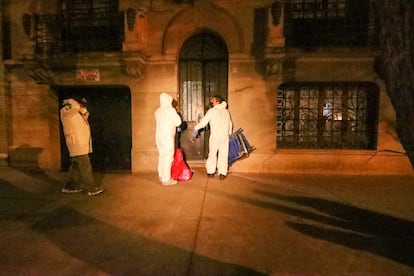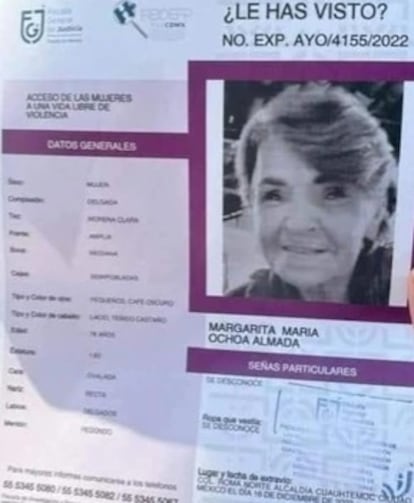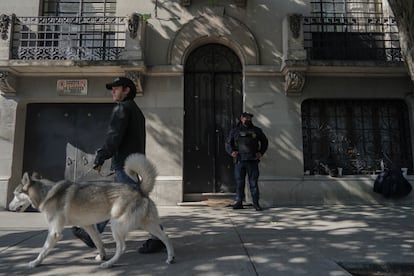Grisly kidnapping and murder of family in Mexico City sends shockwaves through capital
EL PAÍS has received exclusive access to the police testimony of Margarita María Ochoa, whose husband and two nephews were killed by squatters in the historic Roma neighborhood


Margarita María Ochoa’s testimony is chaotic and horrifying.
Just a week before Christmas, she spent more than 48 hours gagged and blindfolded. She was subjected to sexual touching, electrical shocks, cuts to her left foot, beatings and threats. All of this was done to her while she listened to her husband and two nephews being tortured.
The three men resisted the assault until the end. The two brothers – Andrés and Jorge Tirado (27 and 35-years-old respectively) – and their uncle, José Luis González, 73, were ultimately assassinated by their abductors.
Margarita María Ochoa, 72, is the sole survivor of a kidnapping that began at 2pm on Friday, December 16th. It ended on Sunday the 18th, when police officers broke into the building at 113 Medellín Street, in the historic Roma neighborhood of Mexico City. In the middle and upper-class center of the nation’s capital – typically an oasis of peace in a violent country – the discovery was all the more shocking.
Investigators from the Mexico City Prosecutor’s Office conducted an interview with Ochoa on the night she was rescued. EL PAÍS has managed to obtain exclusive access to the transcript
According to her testimony, there were between eight and 10 people involved in the crime, motivated by a property dispute. For seven months, the victims and alleged perpetrators lived together in a two-story house. Upstairs lived Ochoa, González and their nephews. Below lived three of the detainees: Blanca Hilda Abrego (mother), Sally Mechaell Arenas (daughter) and Randy Arenas (grandson), along with a second three-year-old grandson, whose name is unknown. In addition, Sally Mechaell’s boyfriend, Azuher Lara, also spent a lot of time at the residence. The four adults have been prosecuted and will be held in preventive detention for at least six months.
There is also another alleged accomplice in custody, identified simply as Rebeca. The other suspects have not yet been arrested, although agents hope to find them in the next few days.
On Friday, December 16, at 2pm, Lara went up to the second floor to ask Ochoa’s husband to move his car, with the excuse that it was blocking the path of a technician who had come to fix the washing machine. Five minutes later, Lara returned to say that González had fallen and had suffered a knee injury. Upon going downstairs, Ochoa discovered her husband “lying on the floor, handcuffed, with his face covered in tape.” She saw “a group of between eight to 10 people, all of whom were wearing face coverings.” They pounced on her – she was promptly gagged and blindfolded.

The assailants cut Ochoa’s left foot with a knife, slashing her little finger and the sole. Later, they took her and her husband to another room. They laid him on the ground, while she was placed face down on the bed. Two women put a knife to her neck and administered small electric shocks to make her give up her bank information.
Shortly afterwards, Ochoa heard screams coming from the living room and something that sounded “like a shot” – although in the transcript, she clarifies that she cannot confirm the origin of the noise. The kidnappers appeared with her two nephews, who were also interrogated about their bank details. One said that he only had an envelope with money in the house – the other promised that he had no cash at all.
“From that moment on, I began to hear loud noises of aggression towards my nephews. I assume it was them, because I also heard kicks as if they were defending themselves. I also heard that someone was choking. I cannot specify the time that passed… but I [eventually] stopped hearing the voice of my nephews. I heard a woman say: ‘This one is already dead.’ Someone opened a garbage bag and dragged it across the floor.”
“When they moved my husband, I can assure you that he was alive, because I heard a groan. After that, I didn’t hear anything else.”
Ochoa stayed in the room with a man who was guarding her. She thought they were going to kill her, according to the investigators’ file. A second kidnapper came in at one point and threatened to rape her. She told him not to dare because “she could be his grandmother.” But even so, the man assaulted her with “sexual touching.” After that, they left her alone. She managed to free herself from the blindfold and the ropes that gagged her, but when she tried to reach the roof to ask for help, her captors discovered her attempted escape. They tied her up again and covered her head with a cloth.
Two men then took her to the cellar. At first, they tied her to a wheelchair, then they moved her to a bed. On Sunday, after two days had passed, she began to feel “dehydrated” and asked for water. They gave her a glass and some apple slices. The oldest female squatter, Abrego – who is a nurse – treated the wounds on Ochoa’s left foot and allowed her to bathe, which resulted in her discovering another bleeding wound “on the left side of her chest.”
Ochoa heard Abrego say that they had a problem with the bodies. The nurse was starting to freak out and wanted to get rid of the evidence.
When the police finally arrived at Medellín 113, Ochoa was found tied to her wheelchair in the living room on the ground floor. Abrego, her daughter and her son-in-law were still in the house – they were promptly arrested.
In another room, agents discovered the three bodies, dead since Friday. According to the investigators, the kidnappers left Ochoa alive so that she would give them ownership of the property.

The Medellín 113 property was owned by two of Ochoa’s brothers. One of them resided there – an elderly gentleman who died of illness in May, identified by the initials C.G.O.A. in the file from the Prosecutor’s Office. Abrego had been his caregiver since at least 2004. As part of the agreement they had, she earned 1,800 pesos a week and lived on the ground floor of the house rent-free, along with her daughter and grandchildren. When the elderly man died, Ochoa and her husband traveled from Hermosillo to Mexico City to attend the funeral. A lawyer friend of theirs recommended that they stay in the house until the inheritance matter was resolved, because Abrego “intended to keep said property.”
The couple stayed in the room that had previously belonged to Ochoa’s brother. They allowed Abrego and her family to continue living on the first floor until they found another home.
In 2019, when Ochoa’s brother fell ill for the first time, Abrego asked the man’s sister to sign documents that recognized her as the old man’s “concubine.” The nurse hoped to collect a widow’s pension. Ochoa agreed to sign them after her brother’s death. But this past May, when he died, the caretaker went a step further, assuring Ochoa that her brother had left the property in Abrego’s name.
“My brother would never have done such a thing,” reads the interrogation transcript. When Ochoa went to the bank to check her brother’s properties, she found out that he had left her as the holder of an account. She also found that Abrego had used up all the money in a different account.
The Tirado brothers – an actor and a musician – were the sons of Ochoa’s sister. Although they had been in the capital for eight years, they moved into the house in June “because their professional activities did not generate stable income.”
“I invited them to live with us, thinking that they would be good company for my husband and me,” Ochoa told police.
When her husband and nephews were murdered, she was about to settle the inheritance of the house, which her brothers had inherited from their grandmother.
“Because my other brother isn’t able to move to Mexico City, we agreed that he would grant me the power to sell the property.”

The murder of the Tirado brothers and their uncle shocked a country that lives with violence on a daily basis and has sky-high homicide statistics. In part, this is because it happened in Roma – a wealthy neighborhood, considered to be part of the bubble that is Mexico City, isolated from the 35,000 yearly murders committed across the rest of the country. It is also because of the unusually gruesome nature of the crimes.
Mexico City’s police are now looking for the last accomplices at large, while investigators are attempting to piece together a case marked by brazen and inexperienced criminals.
Tu suscripción se está usando en otro dispositivo
¿Quieres añadir otro usuario a tu suscripción?
Si continúas leyendo en este dispositivo, no se podrá leer en el otro.
FlechaTu suscripción se está usando en otro dispositivo y solo puedes acceder a EL PAÍS desde un dispositivo a la vez.
Si quieres compartir tu cuenta, cambia tu suscripción a la modalidad Premium, así podrás añadir otro usuario. Cada uno accederá con su propia cuenta de email, lo que os permitirá personalizar vuestra experiencia en EL PAÍS.
¿Tienes una suscripción de empresa? Accede aquí para contratar más cuentas.
En el caso de no saber quién está usando tu cuenta, te recomendamos cambiar tu contraseña aquí.
Si decides continuar compartiendo tu cuenta, este mensaje se mostrará en tu dispositivo y en el de la otra persona que está usando tu cuenta de forma indefinida, afectando a tu experiencia de lectura. Puedes consultar aquí los términos y condiciones de la suscripción digital.








































